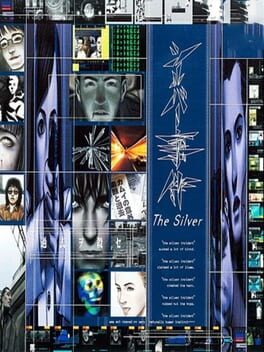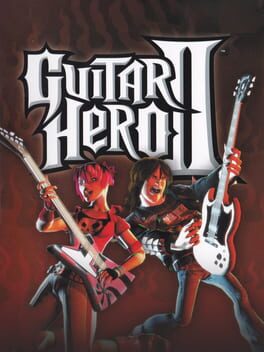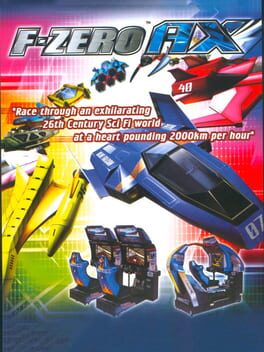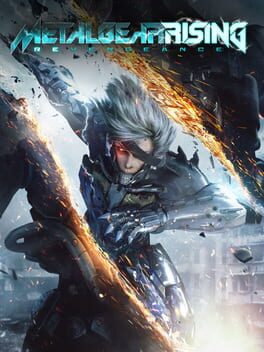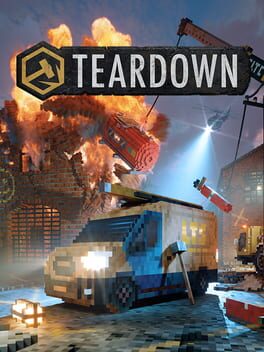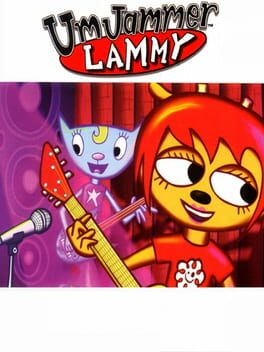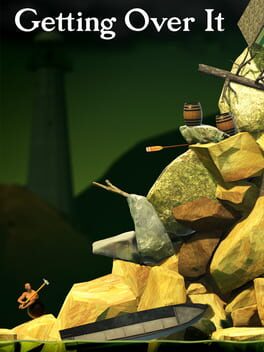limemyth
13 reviews liked by limemyth
Silver Jiken
1999
Guitar Hero II
2006
Possibly as straight-forward as a sequel can get. Guitar Hero II builds upon the roaring foundation of the original game, and simply adds more to the experience, that's especially the case for the diverse music.
There isn't a lot to say about this experience, although its expanded multiplayer features were nice, such as the added bassline for all the songs. A slumbering beast that will soon awaken . . .
Also, the X-plorer guitar that came with the Xbox 360 port is amazing. It's still the best peripheral ever made for modern rhythm games.
There isn't a lot to say about this experience, although its expanded multiplayer features were nice, such as the added bassline for all the songs. A slumbering beast that will soon awaken . . .
Also, the X-plorer guitar that came with the Xbox 360 port is amazing. It's still the best peripheral ever made for modern rhythm games.
No More Heroes
2007
A game I know isn't perfect, but I don't care. It's perfect in my eyes. No More Heroes is a great hack-n-slash game with gratifying visuals, visceral combat, and a supremely interesting story that has a lot for both people that want a fun, simple adventure, and people that want a deep, profound narrative.
The game has a lot to say about how witnessing death can change you as a person, and it's firstly disguised as a goofy action game. This and the director's previous game "killer7" heavily influenced me as a teenager and what I look for in a video game's story.
The Wii version is the most authentic experience, but the Switch version is mostly competent while sporting a better framerate. PC version is very rough and doesn't even include kb+m controls.
The game has a lot to say about how witnessing death can change you as a person, and it's firstly disguised as a goofy action game. This and the director's previous game "killer7" heavily influenced me as a teenager and what I look for in a video game's story.
The Wii version is the most authentic experience, but the Switch version is mostly competent while sporting a better framerate. PC version is very rough and doesn't even include kb+m controls.
F-Zero AX
2003
Throughout my teen years, there was a really REALLY awesome arcade near me that took pride in providing the latest and greatest arcade experiences, and did a great job maintaining all their machines. They would not only keep the big classics in premium condition, but also get the newest in high-profile arcade action. Time Crisis, Tekken, Initial D,, you name it! This place had them all! They were usually imports of the Japanese cabinets, since they would arrive much sooner. People from across the East Coast would hoof it to this humble arcade in New Jersey.
One of those machines was motherfukken F-Zero AX! The premium cabinet with the moving seat, and this was about a month or so before the Gamecube counterpart hit store shelves. I was already a big fan of F-Zero X, so witnessing that big beautiful bastard show up at this arcade was a really significant point of my nerd-ass teens.
I will never forget the first time playing the simplest course for the first time, Mute City. The stunningly gorgeous graphics, the intense speed, the roaring sound design, and that INCREDIBLE remix to the familiar song! Hearing that guitar riff the first time, I want to cry just thinking about the dump truck of dopamine my brain experienced that very moment. It's something I've never felt before, and probably never will again. F-Zero AX still stands as the absolute PEAK of arcade racing goodness, everything about it is perfect.
I even remember getting the Gamecube game immediately when it released. They offered exclusive content if you brought your memory card to the arcade machine and insert it while playing! Unfortunately, the cabinet broke down the day after the game came out, so I wasn't able to even try that. Apparently there was a serious problem with the machine, so they sent it back. Never to be seen in that arcade again. Never did I experience the feeling of heaven-on-earth and then immediate heartbreak like that.
The only other time I've seen this machine was at MAGfest. If you ever go to MAGfest and want to find me, I'll likely be skulking around the F-Zero AX machine because that's all I want to play when I'm there.
One of those machines was motherfukken F-Zero AX! The premium cabinet with the moving seat, and this was about a month or so before the Gamecube counterpart hit store shelves. I was already a big fan of F-Zero X, so witnessing that big beautiful bastard show up at this arcade was a really significant point of my nerd-ass teens.
I will never forget the first time playing the simplest course for the first time, Mute City. The stunningly gorgeous graphics, the intense speed, the roaring sound design, and that INCREDIBLE remix to the familiar song! Hearing that guitar riff the first time, I want to cry just thinking about the dump truck of dopamine my brain experienced that very moment. It's something I've never felt before, and probably never will again. F-Zero AX still stands as the absolute PEAK of arcade racing goodness, everything about it is perfect.
I even remember getting the Gamecube game immediately when it released. They offered exclusive content if you brought your memory card to the arcade machine and insert it while playing! Unfortunately, the cabinet broke down the day after the game came out, so I wasn't able to even try that. Apparently there was a serious problem with the machine, so they sent it back. Never to be seen in that arcade again. Never did I experience the feeling of heaven-on-earth and then immediate heartbreak like that.
The only other time I've seen this machine was at MAGfest. If you ever go to MAGfest and want to find me, I'll likely be skulking around the F-Zero AX machine because that's all I want to play when I'm there.
the twelve-year-olds raving about the memes in this game clearly lack the self-awareness to apply themselves to Monsoon's bossfight, assuming they even at least watched a playthrough online.
Please, dear god almighty, i know the music is really cool and the cutscenes are cool and there's something funny about senate armdude but please play the fucking game first. If you're feeling real daring play an actual entry in the MGS series, maybe even a game that Raiden was in. MGR is an extension of the same character arc and political commentary that originated in Sons of Liberty and provided the foundation for this funny ninja man and his fear of memes.
I'm not even asking for people to just play the game for what it is, I just hope people will finally realize how this game's powerful story and symbolism can just apply to themselves instead of projecting it elsewhere.
Please, dear god almighty, i know the music is really cool and the cutscenes are cool and there's something funny about senate armdude but please play the fucking game first. If you're feeling real daring play an actual entry in the MGS series, maybe even a game that Raiden was in. MGR is an extension of the same character arc and political commentary that originated in Sons of Liberty and provided the foundation for this funny ninja man and his fear of memes.
I'm not even asking for people to just play the game for what it is, I just hope people will finally realize how this game's powerful story and symbolism can just apply to themselves instead of projecting it elsewhere.
Teardown
2020
really fun, super awesome, and one of the most unique approaches to the immersive sim. Voxel design and destructibility go perfectly with that genre, cus I dunno another game that will let you cut down a pillar to make an arch into a ramp. But the first half gets somewhat repetitive with the same objective repeated (steal this. Watch out, it's wired to these alarms so make a path to steal them and escape in 60 seconds). There are some other types of missions, but nothing completely different comes until the 2nd half where it can be a normal stealth mission, or some tornado comes up or this or that happens. More variety in the first half would've been awesome. Now let's pull a second aside to look at the player model choice... you are invisible. You have no player model. Why? Probably so you can self-insert or put in any design you like. Personally, I imagined Teardown Dude as Denzel Washington with a flat cap. What did you imagine teardown dude as? I'd like to know. Please send DM's of what you imagined teardown dude to look like to my discord, jaredleto#6830
Um Jammer Lammy
1999
A game that basically improves upon its predecessor in any given way, this is what I love to see from a sequel/really high effort spin off. The gameplay as a whole feels far more forgiving and functional than with Parappa 1, but beyond that, the more surreal aesthetic this game takes on is far more appealing to me on the whole as someone who can really appreciate a healthy quantity of weird shit. The fact that it now feels possible to feasibly hit the notes without some seriously scuffed timing is an interesting element of the game in particular because it feels extremely clear that the designers realised that players would have greater capabilities this time around thanks to the working mechanics, and so they made things WAY harder than before. The player will get more regularly bombarded by extremely fast phrases combined with rhythm that goes far beyond the weirdness of the first game to the point where it sometimes feels like a challenge just trying to parse how you're meant to approach something. While this sometimes falls extremely flat, such as with stage 5 where it loses any sense of coherency to the point where it just feels artificially difficult, it mostly helps contribute to the vibe of the game and ends up being a nice challenge.
The same sense of sincere warmth can also be felt here, just through a different lens, being of someone rising above their own anxieties compared to Parappa more believing in himself to get through problems that were more outwardly affecting him and those around him. I appreciate this as it really adds to things for this silly narrative to have those moments of empowerment and general feelgood messages ingrained within it, and it's ultimately a huge part of why the aesthetic of this series is so unique. The amount of content here is pretty nice as well, not only having 2 different story modes that end up taking the player through effectively 13 stages, but then having a pretty neat co-op and competitive multiplayer mode as well, really getting the most out of what few tracks are featured here. The game will still probably only take you about 2 - 3 hours to get through all significant content, but that feels like a good amount for a game of this nature, keeping things feeling very clean without anything close to filler to be found, with even the weakest bits still feeling essential in some way or another. Overall I just really like this game, and while there's still some jank that comes through with actually playing it, it's not enough to stop it from being fun, and the immaculate vibes carry this up way higher.
The same sense of sincere warmth can also be felt here, just through a different lens, being of someone rising above their own anxieties compared to Parappa more believing in himself to get through problems that were more outwardly affecting him and those around him. I appreciate this as it really adds to things for this silly narrative to have those moments of empowerment and general feelgood messages ingrained within it, and it's ultimately a huge part of why the aesthetic of this series is so unique. The amount of content here is pretty nice as well, not only having 2 different story modes that end up taking the player through effectively 13 stages, but then having a pretty neat co-op and competitive multiplayer mode as well, really getting the most out of what few tracks are featured here. The game will still probably only take you about 2 - 3 hours to get through all significant content, but that feels like a good amount for a game of this nature, keeping things feeling very clean without anything close to filler to be found, with even the weakest bits still feeling essential in some way or another. Overall I just really like this game, and while there's still some jank that comes through with actually playing it, it's not enough to stop it from being fun, and the immaculate vibes carry this up way higher.
Bennett Foddy has a lot of insight and perspectives to share here on all manner of things; art and how our relationship with it has changed in the age of the internet, of streamers, of lets plays and having everything at our finger tips, the benefits and costs of making your art either abrasive or accessible and how this applies to videogames, about finding worth in aesthetics beyond those that we would typically consider beautiful or appealing, about frustration, and loss, and pain, and starting over. This was all just in the first half of the game, I never could get past the game's mid-point that fans refer to as Orange Hell, and even just that half of the game is full of compelling insights and a lot to chew on.
I don't know, though. I've tried playing this game twice now and have ultimately had to give up not out of frustration or upset or whatever, but just out of the eventual sheer and complete boredom that sets in. Foddy's commentary is in many ways the real meat of the game to me, and at the end of my most recent attempt I'd gone over an hour and a half without hearing any commentary from him, any music, or anything, as I'd repeatedly get up to Orange Hell again only to fall back down. It's not that I'm even upset over all this, but it's just such an immensely under-stimulating experience when you get caught in that grind like I did.
I don't know, though. I've tried playing this game twice now and have ultimately had to give up not out of frustration or upset or whatever, but just out of the eventual sheer and complete boredom that sets in. Foddy's commentary is in many ways the real meat of the game to me, and at the end of my most recent attempt I'd gone over an hour and a half without hearing any commentary from him, any music, or anything, as I'd repeatedly get up to Orange Hell again only to fall back down. It's not that I'm even upset over all this, but it's just such an immensely under-stimulating experience when you get caught in that grind like I did.
The first time I gave this game a try I bounced off of it pretty hard. I found little enjoyment in the Steam version's inconsistent controls and pretentious narration, so I ended up dropping it less than an hour after booting it up.
Some years later as a freshman in college I came across it on the app store during my morning commute. After a few minutes of play I realized the mobile version had two huge advantages: portability and touch controls. I became fascinated with the game not long after that, and since it was always in my pocket I spent every brief respite from student life making slow but steady progress. I'd play it while on the bus, waiting for takeout, even right before I went to bed. Some failures were crushing, but those moments were immediately followed up with joy from how easy it became to regain that progress. That's not to mention how the switch to fine motor skill-reliant touch controls made the game feel much more focused on skill than luck.
Something occurred to me as I reached the last portion of the game: since I had been playing it on my phone and more often than not in public, I never had the sound on. Out of curiosity I cranked the volume up, only to find an uncomfortably forced breathy voice monologuing about the emotional power of my journey, like an off-brand The Beginner's Guide. Suddenly I wasn't so excited about beating the game. I didn't feel like it was about my experience anymore - my progress was all in service of unlocking more schmaltzy dialogue. That's when I remembered the title of the game wasn't Getting Over It, it was Getting Over It with Bennett Foddy. I quickly turned the sound off and immediately started having more fun. I beat the game soon after, and beat it a second time shortly after that. Before long I was able to do a complete run of the game in less than 10 minutes pretty consistently. I could play the first half while barely looking at my phone. I got the gold pot, and finally decided to delete the game after reaching 100 summits. I'll never have the skill or time investment required to master something like Counter Strike or Tekken, but I'm grateful this game gave me a window into what that must feel like. Getting Over It clearly wants to be viewed as a work of art, and by the time I uninstalled the game I completely believed it was. I only wish the game was allowed to speak for itself.
Some years later as a freshman in college I came across it on the app store during my morning commute. After a few minutes of play I realized the mobile version had two huge advantages: portability and touch controls. I became fascinated with the game not long after that, and since it was always in my pocket I spent every brief respite from student life making slow but steady progress. I'd play it while on the bus, waiting for takeout, even right before I went to bed. Some failures were crushing, but those moments were immediately followed up with joy from how easy it became to regain that progress. That's not to mention how the switch to fine motor skill-reliant touch controls made the game feel much more focused on skill than luck.
Something occurred to me as I reached the last portion of the game: since I had been playing it on my phone and more often than not in public, I never had the sound on. Out of curiosity I cranked the volume up, only to find an uncomfortably forced breathy voice monologuing about the emotional power of my journey, like an off-brand The Beginner's Guide. Suddenly I wasn't so excited about beating the game. I didn't feel like it was about my experience anymore - my progress was all in service of unlocking more schmaltzy dialogue. That's when I remembered the title of the game wasn't Getting Over It, it was Getting Over It with Bennett Foddy. I quickly turned the sound off and immediately started having more fun. I beat the game soon after, and beat it a second time shortly after that. Before long I was able to do a complete run of the game in less than 10 minutes pretty consistently. I could play the first half while barely looking at my phone. I got the gold pot, and finally decided to delete the game after reaching 100 summits. I'll never have the skill or time investment required to master something like Counter Strike or Tekken, but I'm grateful this game gave me a window into what that must feel like. Getting Over It clearly wants to be viewed as a work of art, and by the time I uninstalled the game I completely believed it was. I only wish the game was allowed to speak for itself.
